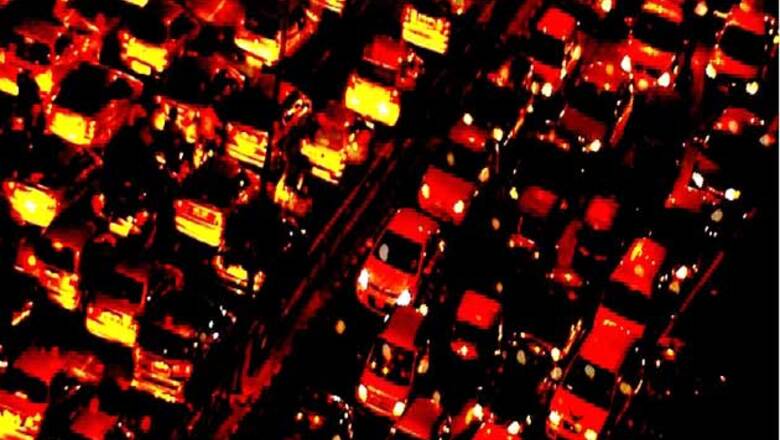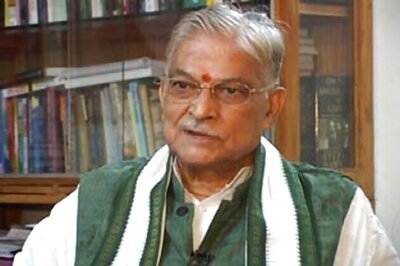
views
THE SUBTEXT OF OUR ANGER
I met MT recently at a friend's 40th birthday. I always look forward to greeting and chatting with him. He's pleasant and affable, and easy to talk to. Well, always, till this last meeting.
This time when we met, something had been triggered in him. He ranted about everything – work, the weather, the city, people, his mobile phone, fuel prices, and the incessant demands of his 12-year-old son.
After listening to his unfamiliar tirade, I asked him whether he'd been aggressive on the road recently.
"How do you mean, 'aggressive'?" he asked.
"Have you been cursing a lot while driving?"
After a few thoughtful moments, he admitted at getting off and pounding on the window of a car, in exasperation, after he'd missed a light.
"The guy wouldn't move in time!" he sought to explain. "I was late and pressed and so I lost it."
"And how did you feel after doing that?" I asked.
"Shaken", he said.
"Well, you're fortunate it didn't turn violent," I said with some concern.
Though we all "lose it" from time to time, what was of concern was that MT had broken a barrier. He had reacted in a way that was unusual to him, and to his consistent and tempered manner. He had let off steam by being physically aggressive. By pounding on the window of another car, he had broken through his own idea of civility.
Such incidents are no longer an uncommon occurrence. What is of concern is that this loss of control over the anger handle seems to be happening to people who are not usually considered angry or aggressive. Something seems to be driving even the calm and civil amongst us towards anger and aggression.
WHAT IS ANGER?
Anger is an emotional response to an obstacle or a threat. It is a burst of energy, a compulsive reaction to anything that threatens to obstruct what we wish to do. We react with anger if we perceive a threat – to our plans, to our identity, to our Ego.
WHAT DRIVES US TO ANGER?
Several instances drive us to anger – hurt, humiliation, and injustice (real or presumed); loss of control and our inability to cope with a situation. When we feel pressed, pushed and pressured, we react with anger.
But anger is really a secondary reaction – behind it and behind all the instances that drive us to anger, lie two root emotions – fear and frustration.
OUR WORLD TODAY
The times we live in are different from any other time in recorded history, in its potent combination of speed and pressure. This pace is being set by technology, and technology moves at the pace of the mind. So, no longer are we following the natural rhythms of the body; instead we are increasingly being led to function at the speed that our tools and gadgets are determining for us.
This makes us frustrated, and fearful. Frustration grows out of having to function in an environment that is constantly changing. By the time one tool or system is figured out, another one has appeared.
While studying in the US a few years ago, I once had a computer engineer visit my apartment to set up the WiFi. While he worked we began to talk. He told me of how often he had witnessed extreme frustration in his clients – it would drive them to fling, stamp on and destroy their computers or some part of it. They had yelled and screamed at him, all in frustration at not being able to figure out their machine, or under pressure of a deadline that wasn't met owing to a technical snag.
Somewhere, within, for many of us, we are frustrated with what is increasingly becoming an alien environment: an environment that is far removed from our emotional intelligence.
Then, there is stress and fatigue, generated by things changing and moving too swiftly. And that can lead to fear - of not being able to cope or keep up with this pace.
LITTLE SPACE FOR EMOTIONS
We are emotional creatures, down to our DNA. Stem cells grow into a certain kind of cell most needed by the body, because they are encoded to do good; they are driven to repair, to build and to restore balance and harmony in the body.
This is significant. But even without understanding the intent of stem cells, it takes little for us to know that we are at our best when we feel most sorted within. Our emotional needs are of paramount importance for us to function at our best.
Today, however, our emotions and intelligence are constantly in threat of being overridden by just trying to keep up with a pace that doesn't seem to relent.
Additionally, as we grow older, we become slower. Apparently, everything in the body begins to go downhill after the age of 25. Everything, except the brain.
Our brain may adapt, but our brain will also change.
In our quest for growth, we have set systems that demand us to be cold and efficient. There seems to be little space for warmth, gentleness and consideration in our functioning. These are not qualities that our economic systems seek to foster in us.
That each one of us will have to look out for our own selves, is the writing between the lines. We are all competing for access to resources and we may have to be ruthless about it. This realisation goes against our fundamental spiritual code. This is tougher to negotiate for those amongst us who are more sensitive.
So we are a part of a structure that ignores our spiritual, emotional and physical rhythms.
That too leads to anger, deep and dangerous anger.
ANGER – ONE LETTER SHORT OF 'DANGER'
Anger is dangerous because it is addictive. When we feel angry, we feel a sense of power, and that can grip us. Angry people often feed on their own anger and get angrier and more aggressive in their behaviour.
This sense of power is often false. Anger gives a person the illusion of being 'right'. When we are angry, we feel self-righteous about it, we feel we are right to express our anger as anger, and humiliate other people. That in-turn only creates more anger.
KEEPING ANGER AT BAY AND AWARENESS OF EXPRESSION
We have to be aware that the emotion of anger is different from the expression of it. Anger is sparked in the primary part of our brain, and it will be sparked unfailingly every time we perceive a threat.
In the Buddhist tradition, Anger is always anger, and just that. It is a mental poison, and no reason, however good it may seem, can justify the aggressive expression of anger.
The significant step is in how we express our anger. Our patterns of expression are often learnt at home – from how our parents or others in close proximity express their anger. If they yelled and screamed at each other, we think it's okay to do that.
To be aware of our own expression helps us break patterns we might be mindlessly perpetuating. So we need to watch how we express our anger.
RHYTHM
We would do well for ourselves were we to set our own rhythm in context to our world today.
As one example, my cell phone is three years old. I refuse to change it, simply because I don't feel ready to negotiate a new machine. I refuse to be bullied by advertisements that say having the latest model will make me cool. I guess I'm uncool by that definition. That' too bad.
This apart, on a more serious note, as Tenzin Palmo, the senior most Buddhist nun in the world, said at one her talks – "You are a marathon runner. It's not like you're doing the 100-yard sprint. And that means you have to find a good rhythm, a good pace, so that you can go a long distance, without completely collapsing."
Which is where I think again of MT, (my friend who lost it recently), cool, calm, civil MT. He obviously is feeling pushed into a rhythm that is not his own. And he's feeling overwhelmed. Enough to disregard his code of civility that he so effortlessly embodied all these years.
Well, MT, find your rhythm, again. Find a pace that doesn't make you unpleasant in your quest for success; at the same time it needn't make you complacent.
RESPONSE
Finally, anger, expressed as anger, is a reaction to a threat. A reaction. What we need to do is not react but rather to respond. "Respond" etymologically from "Responsibility".
That's the key.
Each one of us has to take responsibility for our own anger. Taking responsibility will lead us to making the change required, in our own lives. That's enough for now. More than enough.
And MT, we're going to need your inherent civility.
(Vandana Kohli is an award-winning filmmaker trained at the FTII Pune, and at UCLA, USA. Her recent project is a film on anger, "The Subtext of Anger", shot with renowned experts from the US, UK and India, over three extensive years of research. Vandana has scripted, directed and edited projects for clients that include The National Geographic Channel, The History Channel, Doordarshan, various agencies of the United Nations and the Government of India. She will be joining in a web chat with IBNLive readers at 3 pm on August 28. Post your questions now.)



















Comments
0 comment